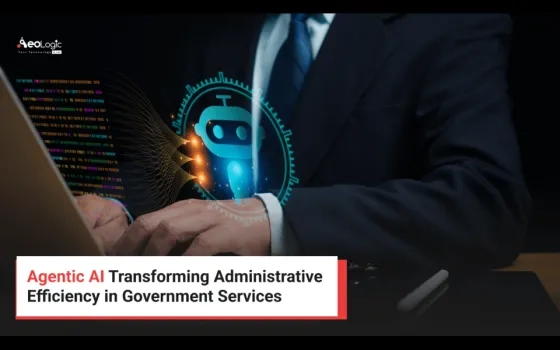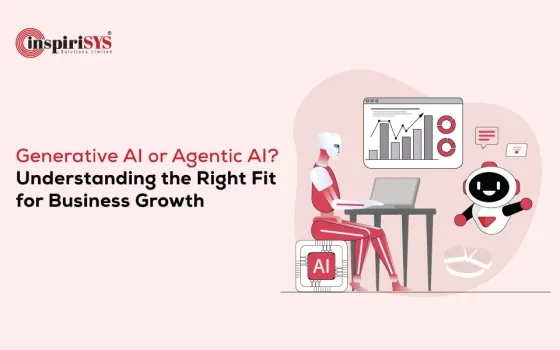Public sector organizations manage an overwhelming amount of paperwork, applications for approvals, and service requests every day. What does this mean? It means that these processes will take longer to fully process and, in some cases frustrate employees and citizens who are waiting for services and/or results. Citizens are looking for faster, more accurate, and simpler and easier access to services. Governments are looking to remove errors, cut costs, and ultimately provide a more transparent means of providing services.
This is the point where Agentic AI in government services can help. It is no longer justifiable to automate simple repetitive functions, but rather governments must utilize intelligent and cognitive systems that can autonomously acting, make decisions that can lead to an efficient automation of complex and sometimes messy workflows. As promised, Agentic AI hold the potential to increase administrative efficiencies while improving citizen satisfaction.
Let’s explore how this innovation is reshaping government operations for the better.
What is the Role of Agentic AI in Government Services?
Agentic AI is different from the robotic process automation many are familiar with. This is not simply rules-based or performing a fixed-task response. This also does not mean Agentic AI solutions are performing a task safer or faster. Using site-specific data is another approach and embodies those notions. However, Agentic AI as an autonomous agent can interpret the data and make decisions. The system adapts its work almost in real time. It does this without needing human input or direction. This applies to nearly all aspects of its function.
Within government services, an AI system can evaluate applications and validate detailed information. It can also triage applications and initiate the next steps own its own. Rather than review each permit manually, the Agency AI replaces the human reviewer by giving approval or rejection for permits that meet or do not meet approval criteria. It can also flag exceptions and generate a report for human review.
This technology assists government departments deal with emerging bottlenecks from backlogs. It keeps administrative processes operational and unbroken speed. Subsequently, this has sped up approvals for licenses, processing of tax, or provision of social benefits.
10 Key Benefits of Agentic AI in Government Services
Agentic AI brings a powerful set of advantages to government services. It is transforming how agencies manage administrative work and deliver outcomes. Here are the top 10 benefits that make this technology a game changer:
1. Faster Decision-Making and Service Delivery
Agentic AI can analyze complex data and make independent decisions. It significantly accelerates the process of issuing permits, processing tax returns, or delivering social services. The resulting speed allows government agencies to assist their citizens on time and reduces their backlog of pending tasks.
2. Higher Accuracy and Reduced Errors
Human data entry and processing are inherently imperfect, which slows government workflows down. Agentic AI uses the rules consistently and detects no inconsistencies, which reduces errors and ensures complete administrative actions.
3. Enhanced Transparency and Accountability
Every action taken by Agentic AI is documented and follows a clear process that everyone can track. This documentation trail provides a framework for accountability and demonstrates that government agencies can fulfill their compliance obligations, which increases trust in the government.
4. Significant Cost Savings
By automating both routine and cause-specific complex tasks, organizations can reduce the amount of manual labor conducted by humans, while reallocating human resources to continued strategic roles, thereby reducing their operational costs without reducing their quality of service.
5. Improved Citizen Experience
By speeding up processes and reducing errors, Agentic AI makes interactions with government services smoother for citizens. Faster responses and clear, transparent processes lead to higher satisfaction and better public perception.
6. Continuous Operation without Fatigue
Unlike human personnel, Agentic AI systems can work around the clock with no breaks or fatigue - always processing information and available to serve citizens 24/7 due to AI's omnipresence. The ability to continually process information means that AI will always be able to respond to citizen requests and adjust to new data even when demand is at peak times.
7. Data-Driven Insights for Better Policy Making
Agentic AI gathers and analyzes enormous amounts of data, generating insights to be used by the government. The ability to provide insight based on existing data allows governments to make and adjust policies and allocate resources through real-time trends and changing demands.
8. Scalability to Handle Growing Demands
Agentic AI can scale with overall growth in population and recommending the services extended by the government. This means that as workloads increase, there is no commensurate need to increase personnel or services with it as agents can accommodate whatever needs arise.
9. Streamlined Inter-Agency Collaboration
Agentic AI is capable of bridging information gaps between various government departments by automating data exchange and coordinating workflows. This happens because AI naturally connects information stored in different silos throughout government agencies, eliminating delays and improving the overall operations of the government agencies user communities.
10. Enhanced Security and Compliance
Agentic AI systems will be developed to ensure compliance and security-related matters governing the usage of data and access to the web will be followed. This means that when using Agentic AI, governments will not only find AI assistance in possible projects but will also have an opportunity to retain and transform its service delivery and data privacy agreements.
These are why Agentic AI represents an exciting opportunity for public administration; not just to optimize its functions, but also to build confidence through innovative service delivery that delivers improvements in transparency, reliability, and responsiveness to and for citizens.
Challenges and Considerations When Implementing Agentic AI
Agentic AI, while exhibiting a variety of demonstrable benefits, has its challenges in government applications. One of the key challenges will be data privacy. Government data tends to be very sensitive.
That means there have to be very stringent controls on the systems we use for management. Protecting personal data is of utmost importance. The application of laws regarding data protection is essential not only to avoid legal entanglement - also to support public confidence.
Another major hurdle is the general compatibility of Agentic AI with legacy infrastructure. Many governmental organizations still have an antiquated infrastructure.
These types of systems may not be compatible with newer AI capabilities at all. This creates additional burdens on implementation due to a lack of compatibility. Prior careful planning must be considered prior to implementation.
In addition to technical knowledge, proper preparation is crucial to avoid potential problems. If organizations are not prepared for the transition towards AI, the adoption of AI may become delayed or ineffective in common use.
Workforce buy-in and adaptation is also an important factor. Government employees may be concerned about job security in a transitioning job landscape. Others may simply reject any decisions made by AI agents.
Consideration for both individual and collective concern needs to be addressed. It is vital to have training to help staff understand the new AI technology.
Open communications with staff will return trust between humans and AI systems. Trust is needed to facilitate human-technology collaborations. When employees feel engaged, kept informed and supported, collaborative action for combatting hard law practices becomes easier and more effective.
Lastly, governments need a strong governance structure for Agentic AI. Governance is an important part of the oversight for AI because strangers or organizations using AI can have complicated or unexpected consequences. And there has to be strong oversight to ensure ethical discourse or standards are followed.
For example self-driving motor vehicles that can use AI need to have vigilant and enforced safety procedures. This level of governance oversight is for the protection of citizens and to earn public trust.
Otherwise an organization may abuse or mis-use the AI to extreme ends of behavior or action. Governance is a necessary step if we expect proper use of AI in many public or citizen services.
The Future of Agentic Process Automation in Government Services
The future presents exciting avenues for Agentic AI within government services. AI agents will soon be able to anticipate dysfunction before it occurs. They will provide pre-emptive solutions to the public. Predictive analytics will assist governments to allocate resources to meet the ever changing demands to serve the public.
Most governments will soon be able to move beyond automation to strategic decision-making using Agentic capabilities with AI to make them smarter. Services will be more personalized and citizen-centric. Access to public services will become simpler and more responsive to citizens' needs.
Preparing for that future opportunity starts by making innovation a priority right now, and in partnership with organizations that are experienced in building AI systems with scalable capabilities. The future of agentic process automation represents the opportunity for a smarter government to better serve the public.
Final Take
Agentic AI is revolutionizing the way public institutions are managing administrative workflows. Administrative tasks can be processed faster, more accurately, and transparently. There are definitely challenges: organization, privacy, integration, and adapting the workforce are all real issues.
Government and the like who are implementing agentic AI will absolutely find and make significantly tangible efficiency gains. The more prepared the public institutions are for the future of agentic process automation, the better. Although public institutions need to balance order and invest in emerging technology, this balance is empowering, not only to frontline employees, but to citizens too.
FAQs
How does Agentic AI handle data security in government services?
Agentic AI systems use sophisticated encryption and access controls to protect sensitive government information and follows data protection legislation. The agentic systems track who accessed information and what changes were made, so the information is secured, throughout the agentic AI processes.
Can Agentic AI improve citizen engagement beyond administrative tasks?
Agentic AI applications can merge with chatbots and virtual assistants. In these applications agentic AI will provide real-time responses and contextualized support for personalized access to services, anytime an individual decides to access the service without waiting for a human agent.
What types of government departments benefit most from Agentic AI?
Agentic AI will benefit departments engaged in repetitive and rule-based tasks. This includes areas of licensing, social services, tax, and immigration. Agentic AI provides the ability to automate approvals, checks, and compliance to expedite the processes.
How long does it typically take to implement Agentic AI in government systems?
The time lapse depends on the complexity of the processes and any existing technology stack. On average, implementation would likely take a few months to a year. An implementation that includes careful planning and testing will take less time and deliver a more successful outcome. Phased rollouts can be helpful to avoid continued service disruptions.
Does Agentic AI eliminate the need for human workers in government administration?
No. Agentic AI does not displace human workers. It adopts and automates repetitive and data-heavy tasks. Also, allow employees to focus on more complex and strategic work. Human employees will continue to provide judgment and empathy to the decision-making process.



















